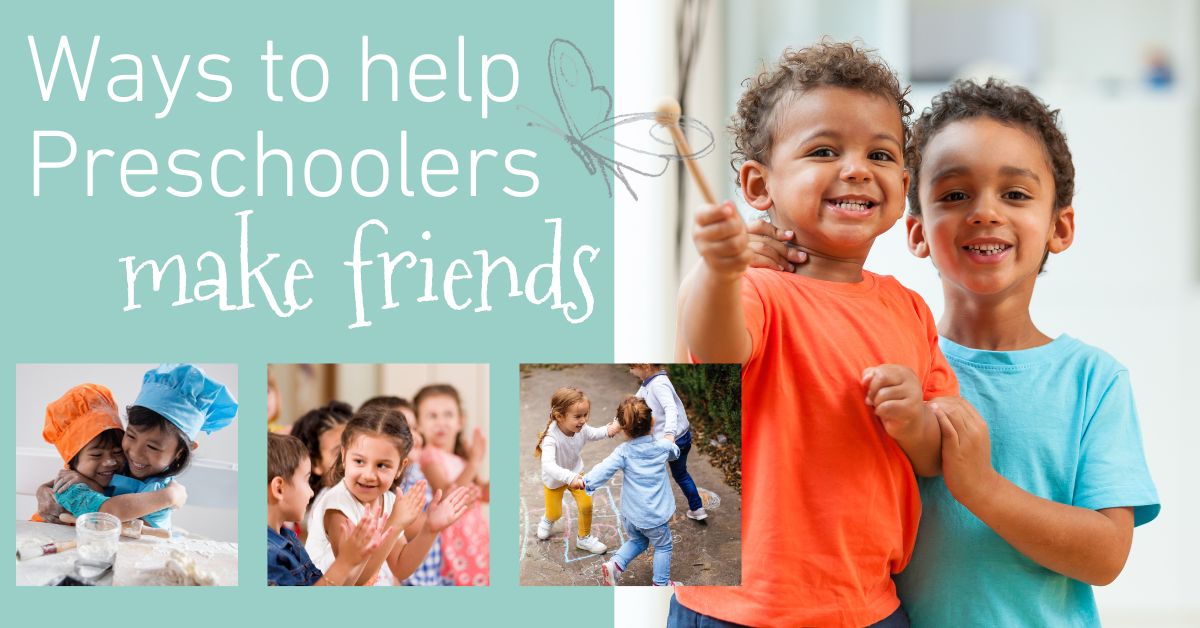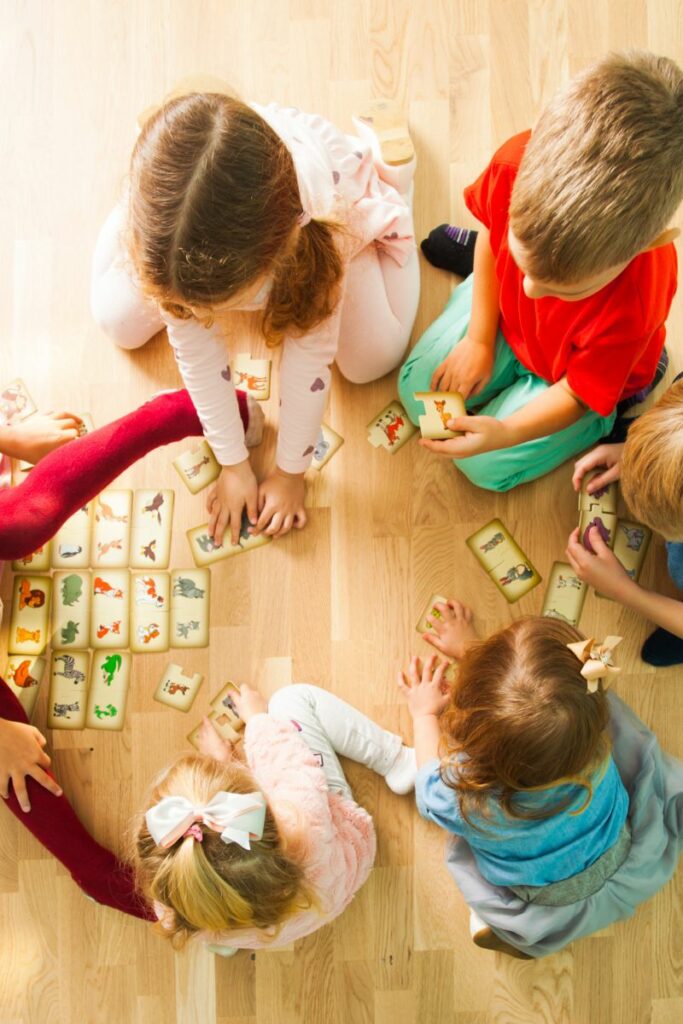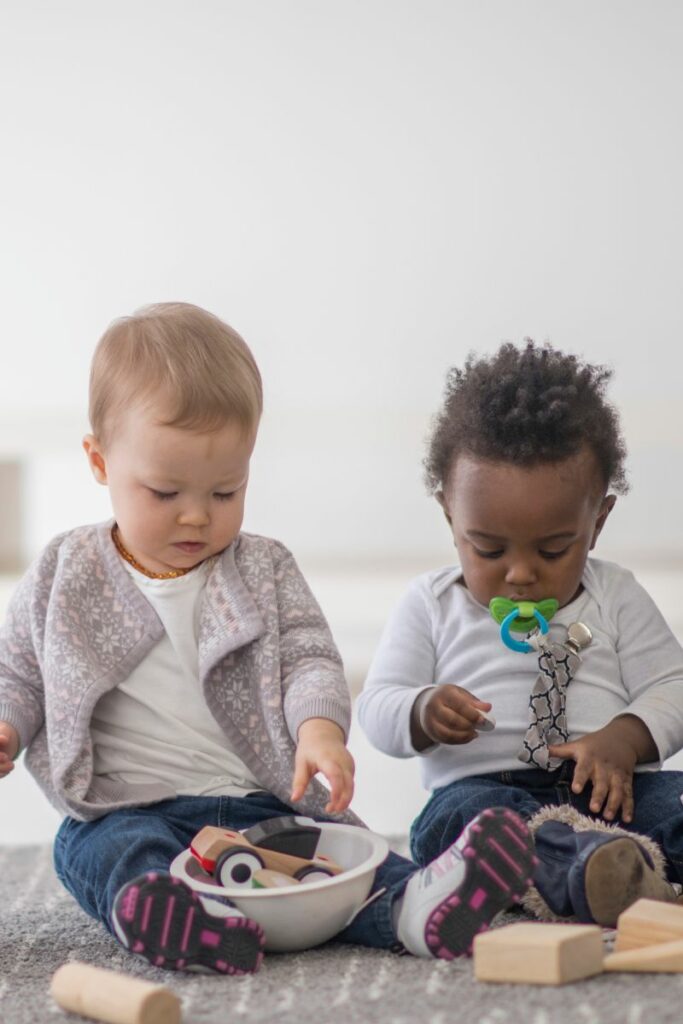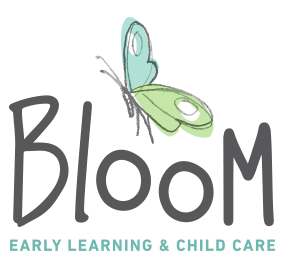
Ways to Help Preschoolers Make Friends
Some children have difficulty making friends, whether they are shy, have difficulty controlling “big emotions” (such as screaming, hitting, and throwing,) or are learning social skills. As a parent, relative or other adult supporting a preschooler you might assume that there’s little you can do to make a difference. Kids are like everyone else – we all have our personal preferences in choosing friends.
“However, you can help kids develop the social and emotional skills they need to make friends. Children need help in learning so many things: empathy, sharing, how to handle big emotions, and “friendship skills,” like taking turns and sharing. We also need to be aware of the child’s temperament and age and understand how kids progress in learning to play with others,” said Deborah Ottman, coordinator of professional development, University of Minnesota – Center for Early Education and Development; and Bloom member. “It’s important to support children’s play and friendship with peers and talk with kids about what makes a good friend. Education from parents, teachers and other adults can all play a role in helping a child succeed.”
As children develop and acquire skills, some may need more adult guidance than others. For instance, a 4-year-old had a fire truck that she scooted around the neighborhood. One day, she climbed out of the truck to take a break, but then spotted a boy slipped into its seat ready to take a spin. She marched up to the boy and ordered him to climb out of her truck. He ignored her, so she grabbed at the strings dangling from his hat and pulled. An adult came running to rescue the boy. Afterward her parents discussed, practiced and modeled sharing, taking turns and explaining empathy to correct the negative behavior. Their guidance and practice paid off. The child entered school with the strong foundation she needed to be ready for kindergarten.
A child’s disposition and age are important factors in determining how you can help children be successful. The table below shows which skills are age appropriate for a child. For example, we wouldn’t expect a two-year-old to be able to master sharing with others because they aren’t ready cognitively. Check out our table below.
Friendship-making and the progression of play : Source: Pathways.org
(Preschoolers are generally 33 months of age to date prior to kindergarten attendance)
| Age | Progression of Play Development |
| 0-2 years | Solitary play – Kids play alone, they enjoy important adults guiding them in interacting with/exploring toys. |
| 2 years | Onlooker – Children watch others playing, but don’t join in |
| 2+ years | Parallel play – Playing side-by-side with different toys, not interacting with one another |
| 3-4 years | Associate play – Playing with same toys or on same play equipment, but in different ways |
| 4+ years | Cooperative play – Playing together and both contributing to the shared activity |
Helping your child build friendship skills also strengthens executive function skills which are mental skills including working memory, flexible thinking, and self-regulation. These skills are necessary for doing well in school and throughout life.
Here are tips for helping your child’s ability to make friends:
Working memory
This skill set refers to how we process, remember, and use information. You can support your small child or pal when you teach them about:
- Following the rules of play: Established rules are typically a big part of play, and we need to remember them to play the game well. Taking turns is a basic element of following rules. You can help children learn the skill by modeling, recommending you begin teaching early. Board games are a great way to help older kids understand appropriate behaviors. You can narrate what should be done to follow the rules of the game. Use language like “Now it’s my turn to pick a card.” and “Now it’s your time to pick up the card.” Ask children to answer questions about playing the game, such as “What does it mean when the card has a green dot?” Make sure to choose activities and games that match a child’s age and ability level.
- Knowing and using social skills: Social situations come with rules of behavior that your child or little buddy will need to be successful, for instance acting polite and friendly. Adults typically know how to use these rules —introducing themselves, using appropriate facial expressions and making basic conversation —ingredients needed to make a personal connection. These ingredients involve remembering and using information. Children will benefit from your efforts teaching social skills and practicing the use of these skills with them. Coaching your child to give a proper introduction can lead to conversations with other kids. They might converse about similar likes, which could lead to engaging in play.
Flexible thinking
You can focus on helping your child use flexible thinking, the ability to think about things in a new or different way. You can help a preschooler develop this skillset by:
- Naming one’s feelings: We need to give young children language to help them name the feelings they have instead of using behaviors to communicate a feeling. For example, if children can use language, help them learn to say what they are feeling and why. When your child throws a toy in response to being told it’s time to clean up, you may tell the child: “You are angry playtime is over; I know you are having fun and understand you feel upset. That’s okay. It’s not okay to throw the truck. Let’s practice saying how you feel instead.”
- Recognizing, accepting, and respecting others’ feelings: A child that has learned to recognize his feelings can learn to recognize and accept another playmate’s feelings, which is the critical skill of empathy. Empathetic children believe that other people’s feelings are as important as their own. When a friend bumps his head on the slide, the empathetic child offers comfort. Children able to make room for other’s thinking and feeling, even if it’s different from their own, make friends more easily. Model and talk about instances when you show empathy and kindness. For example, an adult might say to a child, “Our neighbor doesn’t feel well, so I’ve picked these flowers for her. She loves flowers!” The adult explains how it will make their neighbor feel valued and cared for by others.
- Sharing. A child can learn to share while at play. The ability to share is a skill that is born out of empathy, age, and practice. Preschoolers can begin to master sharing with practice, role playing, adult modeling and discussion. It is important to narrate what’s happening and why. Noticing desirable behavior, such as a child sharing a shovel with another child, is an excellent way for children to be taught in the moment. Give the child positive, specific feedback, explaining what you liked about the behavior. Perhaps say: “I liked the way you took turns with your friend using the shovel.”
Self-regulation
This refers to the set of skills that help us to control our emotions and express them in acceptable ways, inhibit impulsive behavior and control our responses, and manage these sub-skills in combination with how we think and remember.

- Self-Regulation of Emotions: We all need to be able to express how we are feeling, and most adults have learned to do this in acceptable ways. Mastering this skill is essential for making friends. Babies, toddlers, and preschoolers are unable to manage their emotions without the help of caring adults. Young children instinctively rely on using behavior to try to tell us something about the way they are feeling. It’s unpleasant for adults and kids to be around someone who is prone to big behaviors, such as screaming, hitting and other negative behaviors. Adults need to give calm children words to help them express what they are feeling (after an episode) instead of scolding them. Research shows that children who have been taught to manage their emotions instead of using challenging behavior achieve more in school and are more successful throughout life. Some parents might be tempted to withdraw their child from group activities, but we suggest that you work on their emotional self-regulation skills at home and give the child other opportunities to build on their successes.
- Self-regulation of impulses: Learning this skill involves managing impulses and learning to delay gratification. An example of a child who lacks this skill includes: The preschooler who interrupts another child who’s answering a teacher’s question, or pushes another child aside to be first at the water fountain. While it takes a long time to develop, adults can help their children or little pals learn to develop this skill through patience and teaching words that express feelings.
Adaptability
- Know a child’s temperament: Adults can set up children for success by being attuned to an individual child’s needs and disposition. For instance, if you know your little boy is shy, prepare him for a large gathering to which he was invited. Before a party, have a play date in which you and your child can meet the playmate giving the party to better prepare your child for the actual event. Say you have a preschooler who enjoys running and jumping, arrange for her to meet a friend at the park instead of an arts and crafts fair.
- Teach children flexibility: Preschoolers need to adapt to change using skills, such as emotional self-regulation, sharing and resolving conflicts. Role play and discuss with children how to manage changes in a situation or an anticipated event before it occurs. As children build their capacity to combine these skills, quarrels may occur among children who haven’t developed friendship skills and a responsible adult may need to step in.
Resources and Sources
1. Supporting Peer Relationships – The University of Virginia’s School of Education and Human Development provides easy to understand resources and articles about child development.
- Tips on Helping your Child Learn to Build Relationships– This web page from non-profit, ZERO TO THREE, focuses on relationships overall.
- Children with Shy or Slow to Warm Up Temperaments– Rebecca Parlakian explains the importance of supporting little ones that may have a harder time socializing
- Tuning in: Supporting Sharing– Here ZERO TO THREE focuses on one important challenge for helping small children develop “friendship” skills
- Help Your Child Develop Self-Control– The ZERO TO THREE website features this story about many different aspects of what makes a child a good playmate and friend.
For more information about helping children build friendships, contact Bloom Early Learning Center & Child Care at 763-449-0600.

Irene Connors donates her time grant writing and blogging for social service agencies. She served as an information officer/communications specialist for most of her career at the Minnesota Department of Employment and Economic Development (DEED). In addition, she had a role in the Workforce Development unit in which she assisted job seekers find meaningful careers. Prior to joining DEED, she was employed at Allina Health as a communications coordinator and as an economist at the U.S. Department of Labor in Washington, D.C. She earned a bachelor’s degree from the University of Virginia and completed graduate work in professional communication at the University of St. Thomas (Twin Cities).







